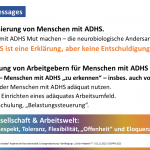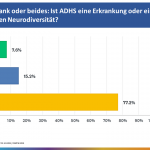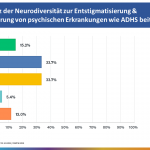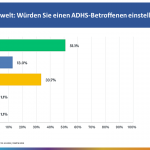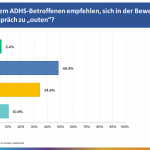Weitere Informationen
Das Thema Neurodiversität wird schon länger in unterschiedlichen Bereichen diskutiert.
Wir – das Forum Neurodivers – haben eine positive Herangehensweise mit Fokus auf ADHS und möchten zur trialogische Auseinandersetzung mit diesem Thema anregen.
Dazu finden Sie nachfolgend u. a. ausgewählte Fachliteratur, Berichte in Publikumsmedien sowie Aktuelles vom Forum Neurodivers.
Fachliteratur (ausgewählt / aktuell)
Building Neurodiversity-Inclusive Postsecondary Campuses: Recommendations for Leaders in Higher Education.
Autoren: Dwyer P, Mineo E, Mifsud K, Lindholm C, Gurba A, Waisman TC.
Veröffentlicht: Autism Adulthood. 2023 Mar 1;5(1):1-14. doi: 10.1089/aut.2021.0042. Epub 2023 Mar 13. PMID: 36941859 Free PMC article.
Zusammenfassung:
„Neurodivergent people are increasingly involved in postsecondary education, but they continue to face serious barriers and challenges on college campuses. These challenges are not only related to disability functional differences and accommodation needs, but also to stigma and prejudice toward neurodivergent people…“ Weiter …

From Puzzle to Progress: How Engaging With Neurodiversity Can Improve Cognitive Science
Autoren: Manalili MAR, Pearson A, Sulik J, Creechan L, Elsherif M, Murkumbi I, Azevedo F, Bonnen KL, Kim JS, Kording K, Lee JJ, Obscura M, Kapp SK, Röer JP, Morstead T.
Veröffentlicht: Cogn Sci. 2023 Feb;47(2):e13255. doi: 10.1111/cogs.13255. PMID: 36807910
Zusammenfassung:
„In cognitive science, there is a tacit norm that phenomena such as cultural variation or synaesthesia are worthy examples of cognitive diversity that contribute to a better understanding of cognition, but that other forms of cognitive diversity (e.g., autism, attention deficit hyperactivity disorder/ADHD, and dyslexia) are primarily interesting only as examples of deficit, dysfunction, or impairment.“…
Weiter …
Developmental diversity: Putting the development back into research about developmental conditions
Autoren: Hens K, Van Goidsenhoven L.
Veröffentlicht: Front Psychiatry. 2023 Jan 6;13:986732. doi: 10.3389/fpsyt.2022.986732. eCollection 2022. PMID: 36684021
Zusammenfassung:
„The dominant discourse surrounding neurodevelopmental conditions such as autism and ADHD emphasizes biological explanations. Neurodevelopmental conditions are conceived as different types of brains, the result of different types of genes. This way of thinking is present both in medical research and in clinical practice.“…
Weiter …
Neurodivergence-informed therapy.
Autoren: Chapman R, Botha M.
Veröffentlicht: Dev Med Child Neurol. 2023 Mar;65(3):310-317. doi: 10.1111/dmcn.15384. Epub 2022 Sep 9.PMID: 36082483
Zusammenfassung:
„The neurodiversity movement is a social movement that emerged among autistic self-advocates. It has since spread and has been joined by many with diagnoses of attention-deficit/hyperactivity disorder, dyslexia, and developmental coordination disorder among others.“…
Weiter …
The neurodiversity concept: is it helpful for clinicians and scientists?
Autoren: Sonuga-Barke E, Thapar A.
Veröffentlicht: Lancet Psychiatry. 2021 Jul;8(7):559-561. doi: 10.1016/S2215-0366(21)00167-X. Epub 2021 May 10. PMID: 33984295
Zusammenfassung:
„ADHD and autism spectrum disorder are conceptualised as discrete, categorical, neurodevelopmental disorders, which originate in early development 1 and are assumed to be the result of underlying brain dysfunction.2„…
Weiter …

Designed by Freepik
Hirschhausen und ADHS
Hirschhausens Check-up
Arzt und Moderator Eckart von Hirschhausen hat vor 30 Jahren in der Kinder- und Jugendpsychiatrie mit jungen ADHS-Patienten gearbeitet. Jetzt hat er eine Reportage über ADHS gemacht. Auch er selbst ist von der Krankheit betroffen.
In seiner Sendung spricht er über ADHS u.a. mit ADHS-Expert:innen wie Frau Prof. Dr. med. A. Philipsen (Universitätsklinikum Bonn) und Prof. Dr. med. A. Reif (Universitätsklinikum Frankfurt).

Manager plädiert für Neurodiversität
„ADHS ist eine meiner größten Superkräfte„
„Der Manager Rahmyn Kress hat spät erfahren, dass er von der Aufmerksamkeitsstörung ADHS betroffen ist. Für ihn ist das Konzert im Kopf kein Makel – sondern eine Gabe, die ihn kreativer macht. “
Manager mit ADHS
„Neurodiverse Menschen fallen oft durchs Raster“
„In Deutschland haben neurodiverse Menschen noch keine gute Lobby. Der deutsche Manager und Gründer Rahmyn Kress, selbst von Dyslexie und ADHS betroffen, will das ändern. Er fordert, dass in jedem Vorstand oder Aufsichtsrat jemand sitzt, der anders denkt.“
ADHS im Job
„Es gibt viele ADHSler, die in Hochleistungsjobs arbeiten“
„ADHS bringen viele mit Konzentrationsschwäche und Defiziten in Verbindung – tatsächlich arbeiten viele Betroffene in Hochleistungsjobs. Warum sie auch außergewöhnlich gute Führungskräfte sein können, erklärt ein ADHS-Forscher.“
Rückblicke: DGPPN Diskussionsforen
DGPPN 2023 / Berlin, 02.12.2023
Auf dem DGPPN 2023 fand am Samstag Morgen, 02.12.2023, das 2. Diskussionsforum mit dem Titel „Neurodivers, krank oder beides: Aspekte der Neurodiversität: Entstigmatisierung – Befähigung – „Schön-Rederei“ mit über 200 Teilnehmer*innen statt.
Nach kurzer Einführung durch PD Dr. D. Schöttle und Dr. A. Neuy-Lobkowicz und einem Rückblick auf das Diskussionsforum des DGPPN 2022 folgten 5 Impulsvorträge:
– Impuls 1: Perspektive der Wissenschaft / Prof. A. Philipsen
– Impuls 2: Perspektive des Behandlers / Dr. A. Neuy-Lobkowicz
– Impuls 3: Die Perspektive eines Betroffenen / O. Just
– Impuls 4: Perspektive Entstigmatisierung / Prof. G. Schomerus
– Impuls 5: Perspektive der Selbsthilfe / Dr. M. Bea
Diese einleitenden Impulsvorträge beleuchteten verschiedene Aspekte der Neurodiversität mit dem Fokus ADHS & Arbeitwelt / Beruf aus der jeweiligen Perspektive Wissenschaft – Behandler – Betroffener – Entstigmatisierung – Selbsthilfe.
Nicht nur die Diskutant*innen des Forums, sondern auch die über 200 im Plenum sitzenden Kongressteilnehmer*innen beteiligten sich mit vielen Impulsen, fachlichen und persönlichen Erfahrungen und weiteren Fragestellungen an der Diskussion.
Per Live-Online-Umfrage unter den anwesenden Kongressteilnehmer*innen wurde zudem die Meinung zu verschiedenen Fragen eingefangen und in die Diskussion mit eingebunden. Diese Ergebnisse finden Sie nachfolgend.
Vielen Dank an Prof. A. Philipsen, Prof. G. Schomerus und Dr. M. Bea – und auch allen aktiven Teilnehmer*innen, die durch ihre Impulse und Stimmungsabgabe das Diskussionsforum inhaltlich unterstützt haben.
DGPPN 2022 / Berlin, 25.11.2022
Am 25.11.2022 fand auf dem DGPPN 2022 das 1. Diskussionsforum mit dem Titel „Neurodivers, krank oder beides: Ist ADHS eine Erkrankung oder ein Ausdruck der mesnchlichen Neurodiversität?“ mit über 240 Teilnehmern statt.
Nach kurzer Einführung durch PD Dr. D. Schöttle und Dr. A. Neuy-Lobkowicz folgten 5 Impulsvorträgen, die das Thema Neurodiversität bei ADHS aus trialogischer Perspektive beleuchteten, wurde differenziert zu unterschiedlichen Aspekten von Neurodiversität diskutiert.
Nicht nur die 6 Diskutant*innen, sondern auch die im Plenum sitzenden Kongressteilnehmer*innen beteiligten sich mit vielen Impulsen, fachlichen und persönlichen Erfahrungen und weiteren Fragestellungen an der Diskussion.
Per Live-Online-Abstimmung unter den anwesenden Kongressteilnehmer*innen wurde zudem die Meinung zu 2 Fragen eingefangen und in die Diskussion mit eingebunden.
Vielen Dank an Prof. A. Philipsen, Dr. C. I. Malke, Dr. M. Bea sowie L. Johanssen – und auch allen aktiven Teilnehmer*innen, die durch ihre Impulse und Stimmungsabgabe das Diskussionsforum inhaltlich unterstützt haben.




